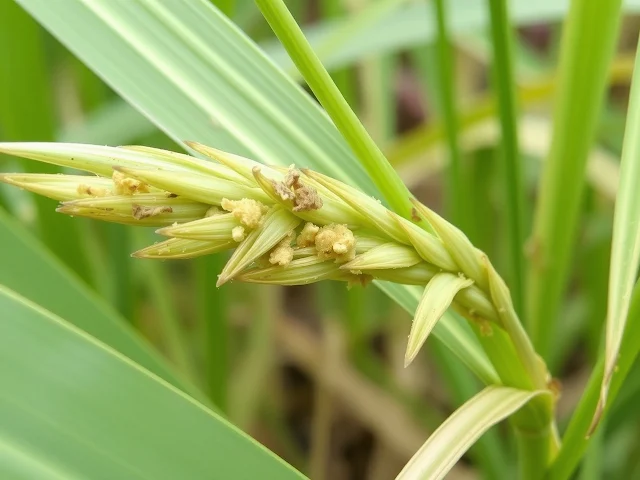Recommended Posts
- Get link
- X
- Other Apps
Sub-Page 1: Common Crop Diseases in India
Learn about the most prevalent crop diseases affecting Indian agriculture – rice blast, wheat rust, cotton leaf curl, and more. Find out how to identify and manage them.
Rice Blast (Magnaporthe oryzae): Perhaps the most devastating rice disease globally.
Symptoms: Diamond-shaped, grayish-brown lesions on leaves, often with a dark border. Can also affect the panicle (grain head), causing unfilled grains.
Causes: Fungal pathogen spread by wind and water.
Management: Resistant varieties, proper field sanitation, fungicides.
Introduction
India’s diverse climate and agricultural practices support a wide range of crops, but also create ideal conditions for numerous plant diseases. These diseases can devastate yields, impacting the livelihoods of millions of farmers. Early identification and effective management are crucial. This page provides a comprehensive overview of some of the most common and economically significant crop diseases in India, along with their symptoms, causes, and potential management strategies. Remember, early detection is key – and Plantix can help! [Link to Main Page: Saving Indian Farms: How AI & Your Smartphone Can Diagnose Crop Diseases]
I. Rice Diseases
Rice is a staple food for a large portion of the Indian population, making its health paramount. Several diseases pose significant threats:
Sheath Blight (Rhizoctonia solani): Common in densely planted rice fields.
Symptoms: Elongated, grayish-green lesions on the leaf sheath, often spreading rapidly. Can cause lodging (falling over) of plants.
Causes: Soilborne fungal pathogen.
Management: Resistant varieties, balanced fertilization, fungicides.
Bacterial Leaf Blight (Xanthomonas oryzae pv. oryzae): A significant problem in irrigated rice.
Symptoms: Water-soaked lesions on leaves, often starting as small spots and expanding rapidly. A yellowish halo may surround the lesions.
Causes: Bacterial pathogen spread by water and insects.
Management: Disease-free seeds, crop rotation, bactericides.
Wheat Rusts (Puccinia spp.): Three main types – Yellow (stripe rust), Brown (leaf rust), and Black (stem rust).
Symptoms: Pustules (small, reddish-brown or yellow spots) on leaves and stems. Severe infections can reduce grain yield and quality.
Causes: Fungal pathogens spread by wind.
Management: Resistant varieties, fungicides, monitoring and early intervention.
II. Wheat Diseases
Wheat is another crucial crop in India, and its production is often threatened by fungal diseases:
Powdery Mildew (Blumeria graminis f. sp. tritici): Common in cooler, humid conditions.
Symptoms: White, powdery growth on leaves and stems. Can reduce photosynthetic capacity.
Causes: Fungal pathogen.
Management: Resistant varieties, fungicides.
Cotton Leaf Curl Virus (CLCuV): A widespread and devastating disease.
Symptoms: Distorted and curled leaves, stunted growth, reduced boll formation.
Causes: Transmitted by whiteflies.
Management: Insecticide application to control whiteflies, resistant varieties.
III. Cotton Diseases
Cotton is a major cash crop in India, and several diseases can significantly impact its yield:
Alternaria Leaf Spot (Alternaria macrospora): Common in humid conditions.
Symptoms: Dark, circular spots on leaves, often with a yellow halo. Can cause defoliation.
Causes: Fungal pathogen.
Management: Fungicides, proper field sanitation.

Sugarcane Red Rot (Colletotrichum falcatum): Affects sugarcane, causing significant yield losses. Symptoms include reddish discoloration of the internodes.
Tomato/Potato Late Blight (Phytophthora infestans): A destructive disease causing rapid decay of leaves and fruits.
Mango Anthracnose (Colletotrichum gloeosporioides): Affects mango fruits, causing dark, sunken lesions.
Indian Council of Agricultural Research (ICAR): https://www.icar.org.in/
State Agricultural Universities (search for your state's agricultural university online)
Krishi Vigyan Kendras (KVKs) – local agricultural extension centers.
IV. Other Important Diseases
Using Plantix for Early Detection
Don't wait for symptoms to become severe! Plantix can help you identify these diseases in their early stages, allowing you to take timely action and protect your crops. Simply take a photo of the affected plant part with your smartphone, and Plantix's AI will provide a diagnosis and recommendations. [Link to Main Page: Saving Indian Farms: How AI & Your Smartphone Can Diagnose Crop Diseases]
Resources for Further Information:
Disclaimer: This information is for general guidance only. Always consult with a qualified agricultural expert for specific diagnosis and treatment recommendations.
Internal Links Used:






Comments
Post a Comment